代词、情态动词的讲解+习题(无答案)
文档属性
| 名称 | 代词、情态动词的讲解+习题(无答案) |
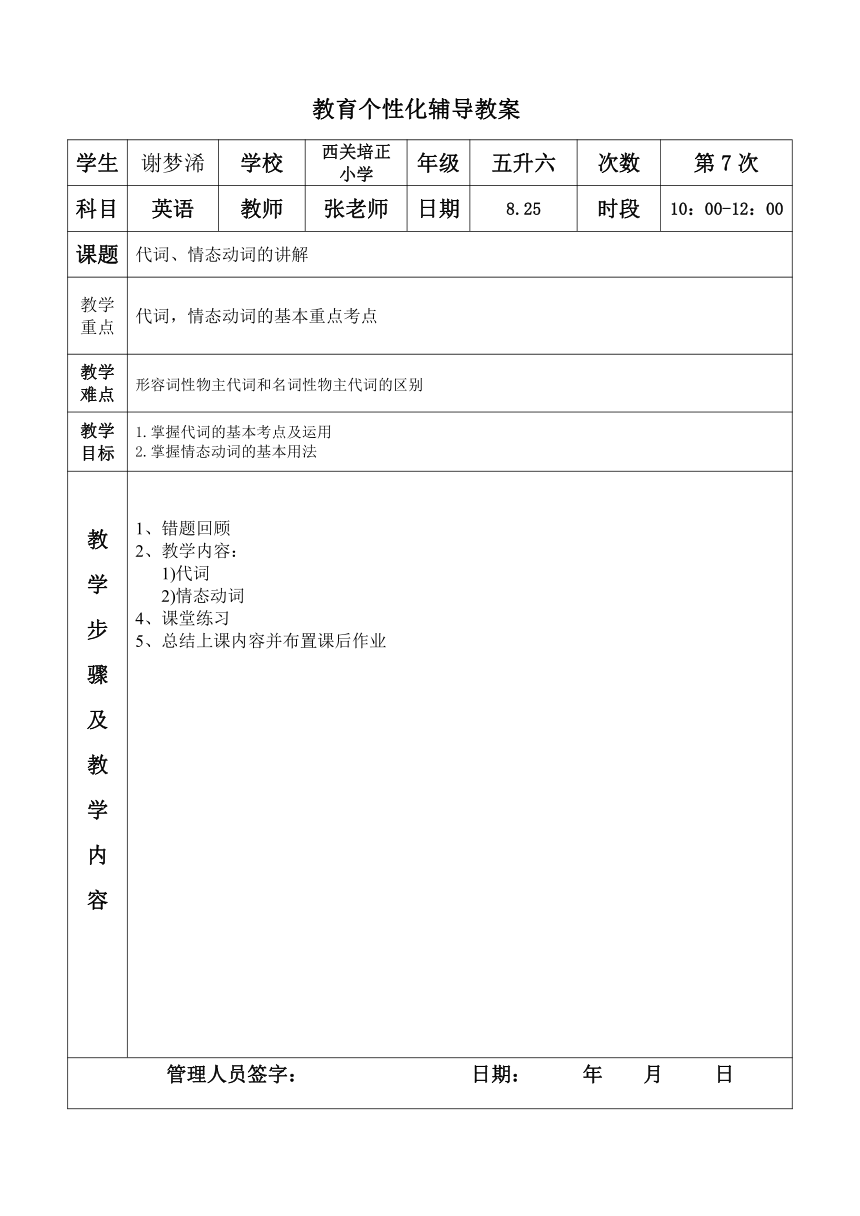
|
|
| 格式 | zip | ||
| 文件大小 | 79.3KB | ||
| 资源类型 | 教案 | ||
| 版本资源 | 教科版(广州) | ||
| 科目 | 英语 | ||
| 更新时间 | 2017-10-10 00:00:00 | ||
图片预览

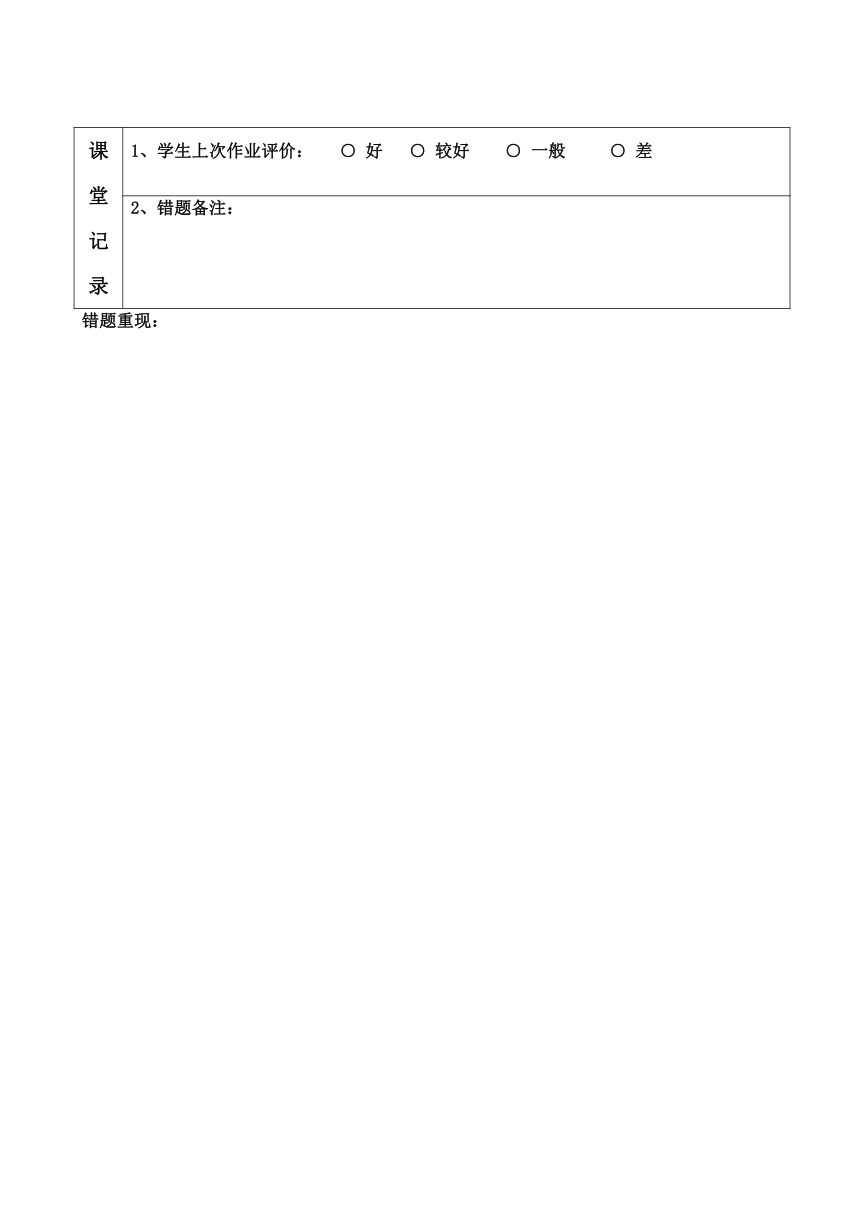
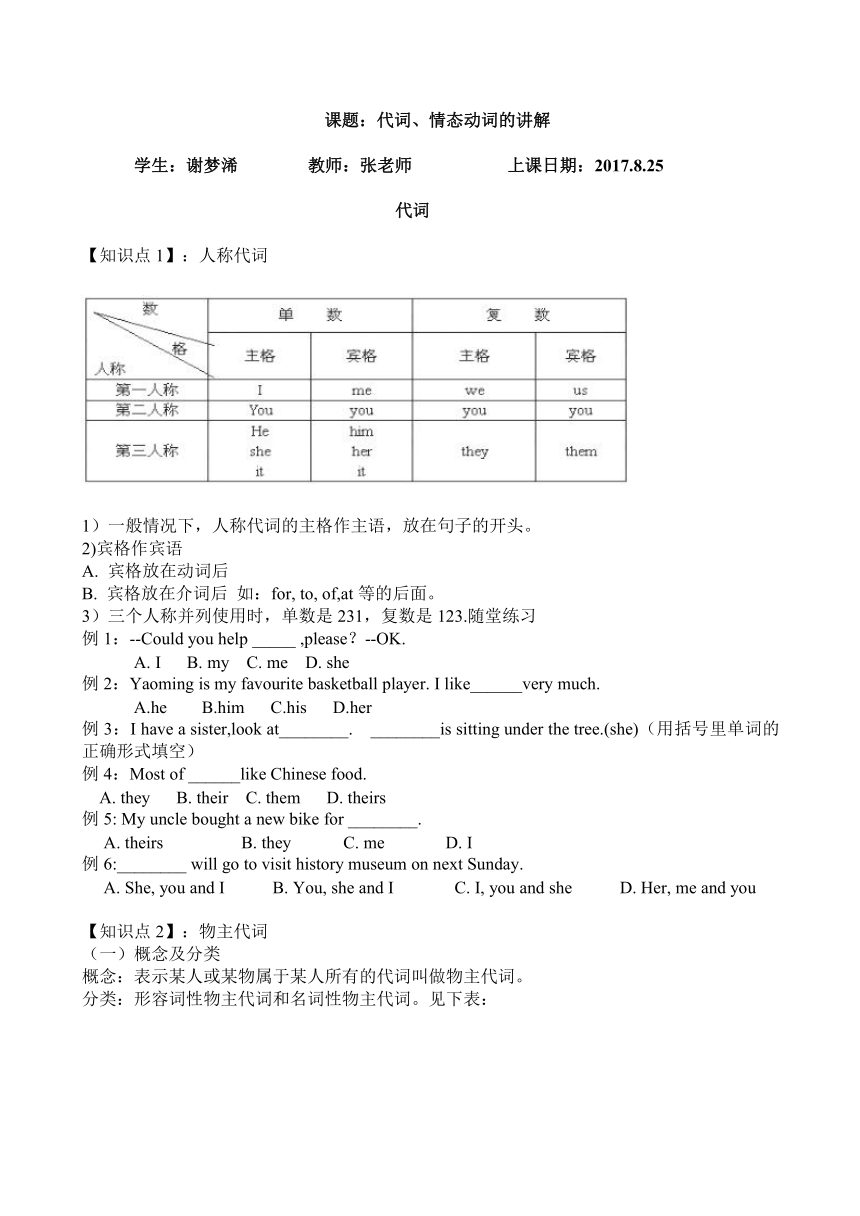
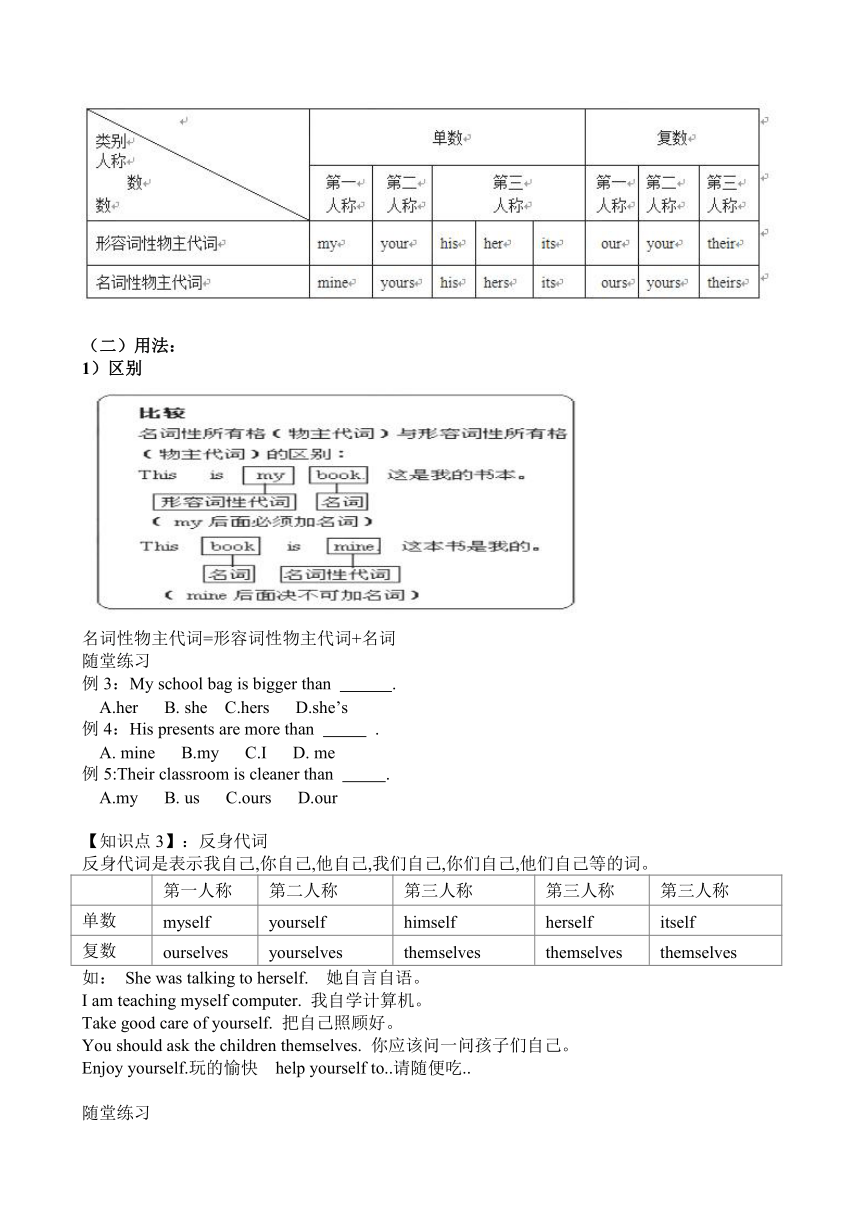
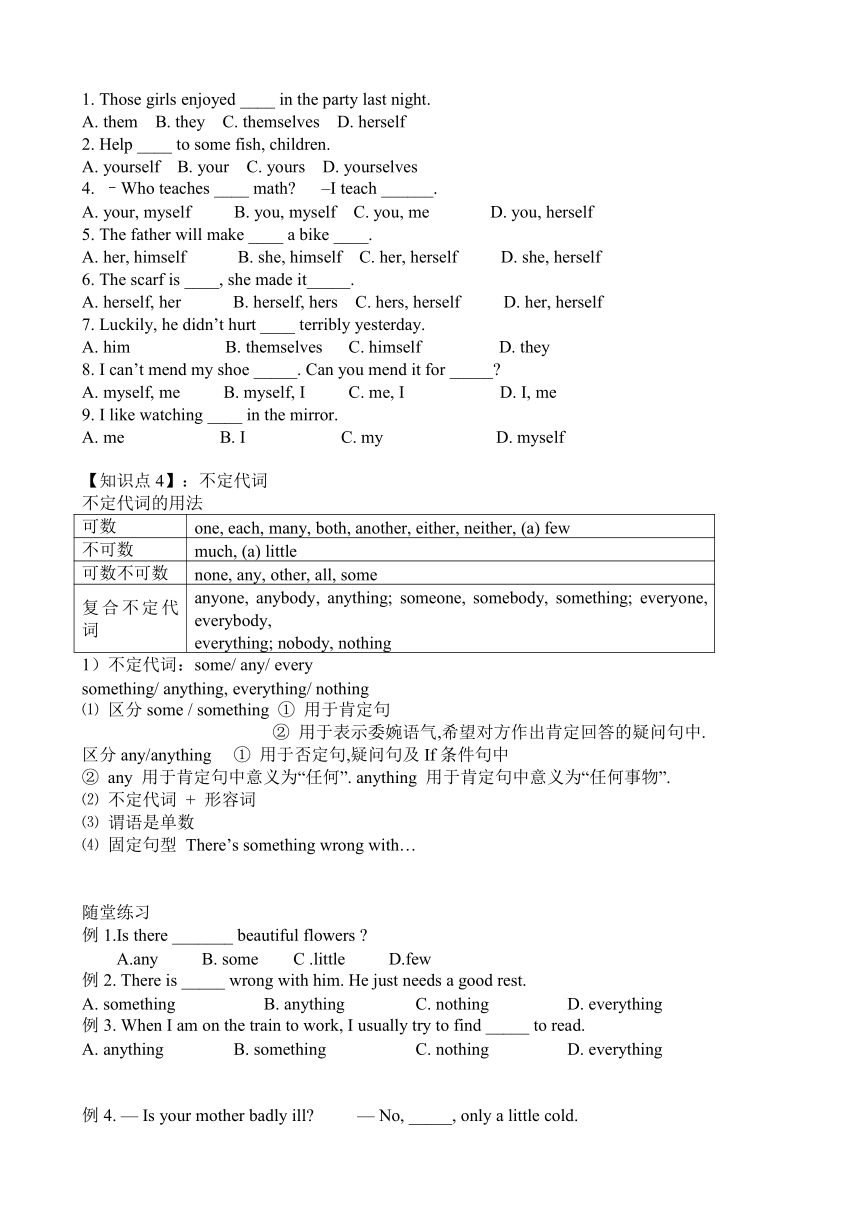
文档简介
教育个性化辅导教案
学生
谢梦浠
学校
西关培正小学
年级
五升六
次数
第7次
科目
英语
教师
张老师
日期
8.25
时段
10:00-12:00
课题
代词、情态动词的讲解
教学重点
代词,情态动词的基本重点考点
教学难点
形容词性物主代词和名词性物主代词的区别
教学目标
1.掌握代词的基本考点及运用2.掌握情态动词的基本用法
教学步骤及教学内容
1、错题回顾2、教学内容:
1)代词
2)情态动词4、课堂练习5、总结上课内容并布置课后作业
管理人员签字:
日期:
年
月
日
课堂记录
1、学生上次作业评价:
○
好
○
较好
○
一般
○
差
2、错题备注:
错题重现:
课题:代词、情态动词的讲解
学生:谢梦浠
教师:张老师
上课日期:2017.8.25
代词
【知识点1】:人称代词
INCLUDEPICTURE
"D:\\My
Documents\\四中C3\\18.files\\tbjx.files\\1.jpg"
\
MERGEFORMAT
1)一般情况下,人称代词的主格作主语,放在句子的开头。
2)宾格作宾语
A.
宾格放在动词后
B.
宾格放在介词后
如:for,
to,
of,at等的后面。
3)三个人称并列使用时,单数是231,复数是123.随堂练习
例1:--Could
you
help
_____
,please?--OK.
A.
I
B.
my
C.
me
D.
she
例2:Yaoming
is
my
favourite
basketball
player.
I
like______very
much.
A.he
B.him
C.his
D.her
例3:I
have
a
sister,look
at________.
________is
sitting
under
the
tree.(she)(用括号里单词的正确形式填空)
例4:Most
of
______like
Chinese
food.
A.
they
B.
their
C.
them
D.
theirs
例5:
My uncle bought a new bike for ________.
A. theirs B. they C. me D. I
例6:________ will go
to
visit
history
museum
on
next
Sunday.
A. She, you and I B. You, she and I C. I, you and she D. Her, me and you
【知识点2】:物主代词
(一)概念及分类
概念:表示某人或某物属于某人所有的代词叫做物主代词。
分类:形容词性物主代词和名词性物主代词。见下表:
INCLUDEPICTURE
"C:\\Users\\windows8-pc\\AppData\\Roaming\\Tencent\\Users\\153496104\\QQ\\WinTemp\\RichOle\\4OXQJD5CBRCN2}C4A(DI3ZC.png"
\
MERGEFORMATINET
(二)用法:
区别
INCLUDEPICTURE
"http://resource.hkedu./Resource/CZ/CZYY/DCYFWF/WDYYYF/0009_YY000026_2.gif"
\
MERGEFORMATINET
名词性物主代词=形容词性物主代词+名词
随堂练习
例3:My
school
bag
is
bigger
than
.
A.her
B.
she
C.hers
D.she’s
例4:His
presents
are
more
than
.
A.
mine
B.my
C.I
D.
me
例5:Their
classroom
is
cleaner
than
.
A.my
B.
us
C.ours
D.our
【知识点3】:反身代词
反身代词是表示我自己,你自己,他自己,我们自己,你们自己,他们自己等的词。
第一人称
第二人称
第三人称
第三人称
第三人称
单数
myself
yourself
himself
herself
itself
复数
ourselves
yourselves
themselves
themselves
themselves
如:
She
was
talking
to
herself. 她自言自语。
I
am
teaching
myself
computer.
我自学计算机。
Take
good
care
of
yourself.
把自己照顾好。
You
should
ask
the
children
themselves.
你应该问一问孩子们自己。
Enjoy
yourself.玩的愉快
help
yourself
to..请随便吃..
随堂练习
1.
Those
girls
enjoyed
____
in
the
party
last
night.
A.
them
B.
they
C.
themselves
D.
herself
2.
Help
____
to
some
fish,
children.
A.
yourself
B.
your
C.
yours
D.
yourselves
4.
–Who
teaches
____
math
–I
teach
______.
A.
your,
myself
B.
you,
myself
C.
you,
me
D.
you,
herself
5.
The
father
will
make
____
a
bike
____.
A.
her,
himself
B.
she,
himself
C.
her,
herself
D.
she,
herself
6.
The
scarf
is
____,
she
made
it_____.
A.
herself,
her
B.
herself,
hers
C.
hers,
herself
D.
her,
herself
7.
Luckily,
he
didn’t
hurt
____
terribly
yesterday.
A.
him
B.
themselves
C.
himself
D.
they
8.
I
can’t
mend
my
shoe
_____.
Can
you
mend
it
for
_____
A.
myself,
me
B.
myself,
I
C.
me,
I
D.
I,
me
9.
I
like
watching
____
in
the
mirror.
A.
me
B.
I
C.
my
D.
myself
【知识点4】:不定代词
不定代词的用法
可数
one,
each,
many,
both,
another,
either,
neither,
(a)
few
不可数
much,
(a)
little
可数不可数
none,
any,
other,
all,
some
复合不定代词
anyone,
anybody,
anything;
someone,
somebody,
something;
everyone,
everybody,
everything;
nobody,
nothing
1)不定代词:some/
any/
every
something/
anything,
everything/
nothing
⑴
区分some
/
something
①
用于肯定句
②
用于表示委婉语气,希望对方作出肯定回答的疑问句中.
区分any/anything
①
用于否定句,疑问句及If条件句中
②
any
用于肯定句中意义为“任何”.
anything
用于肯定句中意义为“任何事物”.
⑵
不定代词
+
形容词
⑶
谓语是单数
⑷
固定句型
There’s
something
wrong
with…
随堂练习
例1.Is
there
_______
beautiful
flowers
A.any
B.
some
C
.little
D.few
例2.
There
is
_____
wrong
with
him.
He
just
needs
a
good
rest.
A.
something
B.
anything
C.
nothing
D.
everything
例3.
When
I
am
on
the
train
to
work,
I
usually
try
to
find
_____
to
read.
A.
anything
B.
something
C.
nothing
D.
everything
例4.
—
Is
your
mother
badly
ill
—
No,
_____,
only
a
little
cold.
A.
nothing
serious
B.
serious
nothing
C.
anything
serious
D.
serious
anything
例5.
_____
is
watching
TV.
Let’s
turn
it
off.
A.
Somebody
B.
Anybody
C.
Nobody
D.
Everybody
2)不定代词:many,much,few,little,a
few,a
little
many(很多),a
few(有几个),few(很少)用来代替或修饰可数名词,
much(很多),a
little(有一些),little(很少)用来代替或修饰不可数名词。
a
few和a
little含肯定意义,few和little则表示没有多少,含否定意义。
随堂练习
例1
I
didn't
get
any
letters
yesterday,
but
there
were____
this
morning.
A.
a
little
B.
few
C.
little
D.
a
few
例2
The
film
isn't
interesting.
___
people
like
it.
A.
Few
B.
A
little
C.
A
few
D.
Little
例3
She
can
speak
___
English
now.
A.
a
little
B.
a
few
C.
Many
D.
few
例4
Hurry
up!
There
is____
time
left.
A.
few
B.
a
few
C.
little
D.
a
little
例5
Sorry,
I
can't
answer
your
question.
I
know____
about
the
subject.
A.
a
little
B.
little
C.
few
D.
a
few
3)不定代词.
either/
neither/
both,
all/
none
⑴
both表示
“两者都”,
neither是both的反义词,表示“两者都不”
⑵
all
表示“三者或三者以上都”,
none是all的反义词,表示“三者或三者以上都不”
⑶
either表示“两个中的任意一个”
⑷
both…and…
谓语永复
(5)either…or…“两者中的任意一个”
neither…nor“两者都不”,
要遵循就近原则:这个类型的句子肯定有两个主语,后面的谓语动词和与它靠得最近的主语保持一致。例如
neither
you
nor
I
am
happy(我和你都不高兴)
随堂练习
例1.
—
I
hear
a
new
film
is
on
these
days.
Shall
we
go
to
the
cinema
together,
Lucy
and
Lily
—
_____
Lily
_____
I
will
go
with
you
because
one
of
us
must
be
at
home
to
help
our
father
in
the
garden.
A.
Either,
nor
B.
Either,
or
C.
Neither,
nor
D.
Both,
and
例2.
—
There
is
a
flower
show
in
the
park.
When
would
you
like
to
go,
Saturday
or
Sunday
—
_____
is
OK.
I’m
free
these
two
days.
A.
Either
B.
Neither
C.
Both
D.
None
例3.
—
Are
your
parents
doctors,
too
—
No,
they
are
teachers.
_____
of
them
love
teaching
very
much.
A.
All
B.
Both
C.
None
D.
Neither
情态动词
情态动词的定义:
情态动词有词义,但它不能单独作谓语,它必须和其他动词一起构成谓语。情态动词没有人称和数的变化;它的后面必须跟动词原形。
情态动词的种类:
情态动词有can
(could),
may,
must,
have
to,
shall
(should),
will
(would),
need等,这些是小学阶段需掌握的情态动词。
情态动词的用法:
can,
(could
过去式)
1)
表示能力(体力、知识、技能)。
Can
you
lift
this
heavy
box (体力)
Mary
can
speak
three
languages.(知识)
Can
you
skate (技能)
2)
表示请求和允许。
Can
I
go
now
Could
\Can
you
help
me
----
Yes,
of
course.\Certainly.\
Sure.
Could
\Can
you
tell
me
the
way
to
the
Zoo
3)
表示推测(惊讶、怀疑、不相信的态度),用于疑问句、否定句和感叹句中。
Can
this
be
true
This
can’t
be
done
by
him.
How
can
this
be
true
二、
may
1)
表示请求和允许。否定回答时可用can’t
或mustn’t,表示“不可以,禁止”。
----
May
I
smoke
in
this
room
----
No,
you
mustn’t.
----
May
I
take
this
book
out
of
the
room
----
Yes,
you
can.
(No,
you
can’t
/
mustn’t)
用May
I...?征徇对方许可时比较正式和客气,而用Can
I...?在口语中更常见。
2)表示推测、可能性(不用于疑问句)。
1.He
may
be
very
busy
now.
2.Your
mother
may
not
know
the
truth.
3)用于祈使句,表示祝愿。
May
you
succeed!
三、
must,
have
to
1)
must表示必须、必要,
带有命令强制口气;而have
to表示不得不,很勉强,强调客观需要。
You
must
come
in
time.
We
must
help
each
other.
My
sister
is
ill;
my
mother
has
to
look
after
her.
I
had
to
work
when
I
was
your
age.
注意:must的否定形式mustn’t表示禁止,意思是“不能,不许”。
在回答由must引起的疑问句时,如果是否定的,不能用mustn’t(禁止,不准),而用needn’t,
don’t
have
to(不必要)。
----
Must
we
hand
in
our
exercise
books
today
----
Yes,
you
must.
----
No,
you
don’t
have
to
/
you
needn’t.
2)
must表示推测、可能性(只用于肯定的陈述句),意思为“一定是,必然……”。
1.
You’re
Tom’s
good
friend,
so
you
must
know
what
he
likes
best.
2.
Your
mother
must
be
waiting
for
you
now.
四、
shall,
1)
shall
用于第一人称,征求对方的意见。
What
shall
we
do
this
evening
2)
shall
用于第二、三人称,表示说话人给对方的命令、警告、允诺或威胁。
1.
You
shall
fail
if
you
don’t
work
hard.(警告)
2.
He
shall
have
the
book
when
I
finish
it.(允诺)
3.
He
shall
be
punished.(威胁)
五、
should和shouldn’t表示
应该
劝告、建议。
I
should
help
her
because
she
is
in
trouble.
You
should
go
to
class
right
away.
She
shouldn’t
play
computer
games
too
much.
六、will
(过去式would)
1)
做助动词,表示一般将来时,将要。
He
will
be
home
at
six.
Bob
will
leave
school
next
month.
2)
作为情态动词时表示“愿意”“意愿”“会”。
I
will
help
you.
I
will
never
do
that
again.
Will
/
Would
you
pass
me
the
ball,
please
相关练习:
(一)
用适当的情态动词填空。
1.
Must
I
borrow
the
book
with
my
ID
card
No,
you
________.
2.
________
I
use
your
car
Yes,
you
________.
3.
________
I
go
home
now
No,
you
_________
stay
here.
4. My
mother
is
ill.
I
_________
stay
at
home
and
look
after
her.
5. ________
you
like
some
tea
6.
You
________
take
more
exercise.
7.
________
you
tell
me
how
to
get
to
the
Qingyun
Park
8.
The
clock
________
tell
us
the
time.
9.
________
you
like
to
go
fishing
with
me
10.
________
we
play
football
this
afternoon
(二)
按要求改写句子。
1. I
can
run
fast.
I
________
________
fast.
(否定句)
2. You
must
return
the
book
now.(一般疑问句)
________
I
the
book
now
No,
you
________.
3.
He
can
play
basketball
well.
(一般疑问句)
_______
he
______
basketball
well
4.
They
must
take
the
books
out
of
the
room.
(否定句)
They
________
________
the
books
out
of
the
room.
5. He
should
get
up
early. (否定句)
He
_______
get
up
late.
(三)
选出正确答案。
Lucy
should
her
homework
now.
A.
finishes
B.
finishing
C.
finished
D.
finish
My
mother
would
back
soon.
A.
came
B.
comes
C.
come
D.
will
come
Could
you
me
a
hand.
A.
giving
B.
gives
C.
given
D.
give
Should
I
now.
A.
started
B.
starting
C.
start
D.
starts
I
take
this
one
A.
Could
B.
Will
C.
Are
D.
Do
-
Can
you
speak
English
-
No,
I
.
A.
mustn't
B.
can't
C.
couldn't
D.
may
not
You
go
and
see
a
doctor
because
you
had
a
fever(发烧).
A.
could
B.
might
C.
should
D.
would
Jim
come
tonight,
but
he
isn't
very
sure
yet.
A.
should
B.
might
C.
would
D.
shall
The
children
play
football
on
the
road.
A.
couldn't
B.
could
C.
must
D.
mustn't
-
Can
I
take
this
book
out
-
No,
you
.
A.
must
not
B.
could
not
C.
will
not
D.
aren't
课后作业
一.单项选择。
(
)1.
My
family
____
a
big
family.
My
family
____all
here.
A.
is,
is
B.
are,
are
C.
is,
are
D.
are,
is
(
)2.
This
is
__________.
A.
a
picture
of
family
B.
a
picture
of
my
family
C.
a
family’s
picture
D.
a
family
of
my
picture
(
)3.
Let’s
__________
good
friends.
A.
be
B.
are
C.
is
D.
am
(
)4.
Is
she
your
aunt
Yes,
__________.
A.
she’s
B.
her
is
C.
she
is
D.
he
is
(
)5.
Are
__________
coats
yours
—Yes,
they
are
.
A.
they
B.
these
C.
this
D.
there
(
)6.
Is
that
______
uncle
No,
it
isn’t.
A.
he
B.
she
C.
her
D.
hers
(
)7.
Mrs.
Green
is
__________
grandmother.
A.
Jim
and
Kate
B.
Jim
and
Kate’s
C.
Jim’s
and
Kate’s
D.
Jim
and
Kates’
(
)8.
Do
you
know
the
name
_____Mr.
Green’s
son
A.
in
B.
of
C.
on
D.
or
(
)9.
__________
the
great
photo
of
your
family.
A.
thank
for
B.
Thanks
for
C.
Thank
for
D.
thanks
for
(
)10.
Are
those
your
friends
__________.
A.
Yes,
they’re
B.
No,
they
are
C.
Yes,
they
are
D.
Yes,
those
are
二.用适当的情态动词填空。(20分)
1.
Must
I
borrow
the
book
with
my
ID
card
No,
you
________.
2.
________
I
use
your
car
Yes,
you
________.
3.
________
I
go
home
now
No,
you
_________
stay
here.
4. My
mother
is
ill.
I
_________
stay
at
home
and
look
after
her.
5. ________
you
like
some
tea
6.
You
________
take
more
exercise.
7.
________
you
tell
me
how
to
get
to
the
Qingyun
Park
8.
The
clock
________
tell
us
the
time.
9.
________
you
like
to
go
fishing
with
me
10.
________
we
play
football
this
afternoon
三.按要求改写句子。(20分)
1. I
can
run
fast.
I
________
________
fast.
(否定句)
2. You
must
return
the
book
now.(一般疑问句)
________
I
the
book
now
No,
you
________.
3.
He
can
play
basketball
well.
(一般疑问句)
_______
he
______
basketball
well
4.
They
must
take
the
books
out
of
the
room.
(否定句)
They
________
________
the
books
out
of
the
room.
5. He
should
get
up
early. (否定句)
He
_______
get
up
late.
四.阅读理解(20分)
The
old
name
for
films
was
"moving
pictures".
In
America
they
still
call
them
"movies"
and
they
say,
"Shall
we
go
to
the
movies "
when
we
want
to
say,
"Shall
we
go
to
the
cinema "
Then
one
day,
a
boy
said
to
his
friend,
"Do
you
like
moving
pictures "
the
friend
thought(以为)
that
the
boy
was
going
to
invite
(邀请)him
to
go
to
the
cinema,
so
he
said,
"Yes,
please.
I
like
moving
pictures
very
much."
"Good,"
said
the
first
boy,
"My
father
has
a
picture
shop.
He
sells
pictures.
This
evening
I
have
to
move
(搬)
fifty
heavy
boxes
of
pictures
from
one
place
to
another.
You
like
moving
pictures,
so
I'm
sure
you
enjoy
moving
the
pictures
with
me."
(
)
1.
"Moving
pictures"
was
the
old
name
______
.
A.
for
pictures
B.
for
films
C.
for
America
D.
for
carrying
movies
(
)
2.
______
still
call
films
"movies"
today.
A.
The
boys
B.
The
British
C.
The
Americans
D.
Young
people
(
)
3.When
the
boy
said
to
his
friend,"Do
you
like
moving
pictures "
he
meant(意思是)"___".
A.
Do
you
like
to
go
to
the
cinema
with
me
B.
Do
you
like
to
see
the
film
C.
Do
you
like
to
help
me
move
the
pictures
D.
Do
you
like
old
films
(
)
4.
The
boy's
friend
______
A.
liked
seeing
films
very
much.
B.
liked
to
move
pictures
very
much.
C.
was
always
ready
to
help
others.
D.
liked
to
help
people
move
something.
(
)
5.
The
boy's
father's
job
was
to
______.
A.
show
films
B.
make
films
C.
sell
pictures
D.
draw
pictures
学生
谢梦浠
学校
西关培正小学
年级
五升六
次数
第7次
科目
英语
教师
张老师
日期
8.25
时段
10:00-12:00
课题
代词、情态动词的讲解
教学重点
代词,情态动词的基本重点考点
教学难点
形容词性物主代词和名词性物主代词的区别
教学目标
1.掌握代词的基本考点及运用2.掌握情态动词的基本用法
教学步骤及教学内容
1、错题回顾2、教学内容:
1)代词
2)情态动词4、课堂练习5、总结上课内容并布置课后作业
管理人员签字:
日期:
年
月
日
课堂记录
1、学生上次作业评价:
○
好
○
较好
○
一般
○
差
2、错题备注:
错题重现:
课题:代词、情态动词的讲解
学生:谢梦浠
教师:张老师
上课日期:2017.8.25
代词
【知识点1】:人称代词
INCLUDEPICTURE
"D:\\My
Documents\\四中C3\\18.files\\tbjx.files\\1.jpg"
\
MERGEFORMAT
1)一般情况下,人称代词的主格作主语,放在句子的开头。
2)宾格作宾语
A.
宾格放在动词后
B.
宾格放在介词后
如:for,
to,
of,at等的后面。
3)三个人称并列使用时,单数是231,复数是123.随堂练习
例1:--Could
you
help
_____
,please?--OK.
A.
I
B.
my
C.
me
D.
she
例2:Yaoming
is
my
favourite
basketball
player.
I
like______very
much.
A.he
B.him
C.his
D.her
例3:I
have
a
sister,look
at________.
________is
sitting
under
the
tree.(she)(用括号里单词的正确形式填空)
例4:Most
of
______like
Chinese
food.
A.
they
B.
their
C.
them
D.
theirs
例5:
My uncle bought a new bike for ________.
A. theirs B. they C. me D. I
例6:________ will go
to
visit
history
museum
on
next
Sunday.
A. She, you and I B. You, she and I C. I, you and she D. Her, me and you
【知识点2】:物主代词
(一)概念及分类
概念:表示某人或某物属于某人所有的代词叫做物主代词。
分类:形容词性物主代词和名词性物主代词。见下表:
INCLUDEPICTURE
"C:\\Users\\windows8-pc\\AppData\\Roaming\\Tencent\\Users\\153496104\\QQ\\WinTemp\\RichOle\\4OXQJD5CBRCN2}C4A(DI3ZC.png"
\
MERGEFORMATINET
(二)用法:
区别
INCLUDEPICTURE
"http://resource.hkedu./Resource/CZ/CZYY/DCYFWF/WDYYYF/0009_YY000026_2.gif"
\
MERGEFORMATINET
名词性物主代词=形容词性物主代词+名词
随堂练习
例3:My
school
bag
is
bigger
than
.
A.her
B.
she
C.hers
D.she’s
例4:His
presents
are
more
than
.
A.
mine
B.my
C.I
D.
me
例5:Their
classroom
is
cleaner
than
.
A.my
B.
us
C.ours
D.our
【知识点3】:反身代词
反身代词是表示我自己,你自己,他自己,我们自己,你们自己,他们自己等的词。
第一人称
第二人称
第三人称
第三人称
第三人称
单数
myself
yourself
himself
herself
itself
复数
ourselves
yourselves
themselves
themselves
themselves
如:
She
was
talking
to
herself. 她自言自语。
I
am
teaching
myself
computer.
我自学计算机。
Take
good
care
of
yourself.
把自己照顾好。
You
should
ask
the
children
themselves.
你应该问一问孩子们自己。
Enjoy
yourself.玩的愉快
help
yourself
to..请随便吃..
随堂练习
1.
Those
girls
enjoyed
____
in
the
party
last
night.
A.
them
B.
they
C.
themselves
D.
herself
2.
Help
____
to
some
fish,
children.
A.
yourself
B.
your
C.
yours
D.
yourselves
4.
–Who
teaches
____
math
–I
teach
______.
A.
your,
myself
B.
you,
myself
C.
you,
me
D.
you,
herself
5.
The
father
will
make
____
a
bike
____.
A.
her,
himself
B.
she,
himself
C.
her,
herself
D.
she,
herself
6.
The
scarf
is
____,
she
made
it_____.
A.
herself,
her
B.
herself,
hers
C.
hers,
herself
D.
her,
herself
7.
Luckily,
he
didn’t
hurt
____
terribly
yesterday.
A.
him
B.
themselves
C.
himself
D.
they
8.
I
can’t
mend
my
shoe
_____.
Can
you
mend
it
for
_____
A.
myself,
me
B.
myself,
I
C.
me,
I
D.
I,
me
9.
I
like
watching
____
in
the
mirror.
A.
me
B.
I
C.
my
D.
myself
【知识点4】:不定代词
不定代词的用法
可数
one,
each,
many,
both,
another,
either,
neither,
(a)
few
不可数
much,
(a)
little
可数不可数
none,
any,
other,
all,
some
复合不定代词
anyone,
anybody,
anything;
someone,
somebody,
something;
everyone,
everybody,
everything;
nobody,
nothing
1)不定代词:some/
any/
every
something/
anything,
everything/
nothing
⑴
区分some
/
something
①
用于肯定句
②
用于表示委婉语气,希望对方作出肯定回答的疑问句中.
区分any/anything
①
用于否定句,疑问句及If条件句中
②
any
用于肯定句中意义为“任何”.
anything
用于肯定句中意义为“任何事物”.
⑵
不定代词
+
形容词
⑶
谓语是单数
⑷
固定句型
There’s
something
wrong
with…
随堂练习
例1.Is
there
_______
beautiful
flowers
A.any
B.
some
C
.little
D.few
例2.
There
is
_____
wrong
with
him.
He
just
needs
a
good
rest.
A.
something
B.
anything
C.
nothing
D.
everything
例3.
When
I
am
on
the
train
to
work,
I
usually
try
to
find
_____
to
read.
A.
anything
B.
something
C.
nothing
D.
everything
例4.
—
Is
your
mother
badly
ill
—
No,
_____,
only
a
little
cold.
A.
nothing
serious
B.
serious
nothing
C.
anything
serious
D.
serious
anything
例5.
_____
is
watching
TV.
Let’s
turn
it
off.
A.
Somebody
B.
Anybody
C.
Nobody
D.
Everybody
2)不定代词:many,much,few,little,a
few,a
little
many(很多),a
few(有几个),few(很少)用来代替或修饰可数名词,
much(很多),a
little(有一些),little(很少)用来代替或修饰不可数名词。
a
few和a
little含肯定意义,few和little则表示没有多少,含否定意义。
随堂练习
例1
I
didn't
get
any
letters
yesterday,
but
there
were____
this
morning.
A.
a
little
B.
few
C.
little
D.
a
few
例2
The
film
isn't
interesting.
___
people
like
it.
A.
Few
B.
A
little
C.
A
few
D.
Little
例3
She
can
speak
___
English
now.
A.
a
little
B.
a
few
C.
Many
D.
few
例4
Hurry
up!
There
is____
time
left.
A.
few
B.
a
few
C.
little
D.
a
little
例5
Sorry,
I
can't
answer
your
question.
I
know____
about
the
subject.
A.
a
little
B.
little
C.
few
D.
a
few
3)不定代词.
either/
neither/
both,
all/
none
⑴
both表示
“两者都”,
neither是both的反义词,表示“两者都不”
⑵
all
表示“三者或三者以上都”,
none是all的反义词,表示“三者或三者以上都不”
⑶
either表示“两个中的任意一个”
⑷
both…and…
谓语永复
(5)either…or…“两者中的任意一个”
neither…nor“两者都不”,
要遵循就近原则:这个类型的句子肯定有两个主语,后面的谓语动词和与它靠得最近的主语保持一致。例如
neither
you
nor
I
am
happy(我和你都不高兴)
随堂练习
例1.
—
I
hear
a
new
film
is
on
these
days.
Shall
we
go
to
the
cinema
together,
Lucy
and
Lily
—
_____
Lily
_____
I
will
go
with
you
because
one
of
us
must
be
at
home
to
help
our
father
in
the
garden.
A.
Either,
nor
B.
Either,
or
C.
Neither,
nor
D.
Both,
and
例2.
—
There
is
a
flower
show
in
the
park.
When
would
you
like
to
go,
Saturday
or
Sunday
—
_____
is
OK.
I’m
free
these
two
days.
A.
Either
B.
Neither
C.
Both
D.
None
例3.
—
Are
your
parents
doctors,
too
—
No,
they
are
teachers.
_____
of
them
love
teaching
very
much.
A.
All
B.
Both
C.
None
D.
Neither
情态动词
情态动词的定义:
情态动词有词义,但它不能单独作谓语,它必须和其他动词一起构成谓语。情态动词没有人称和数的变化;它的后面必须跟动词原形。
情态动词的种类:
情态动词有can
(could),
may,
must,
have
to,
shall
(should),
will
(would),
need等,这些是小学阶段需掌握的情态动词。
情态动词的用法:
can,
(could
过去式)
1)
表示能力(体力、知识、技能)。
Can
you
lift
this
heavy
box (体力)
Mary
can
speak
three
languages.(知识)
Can
you
skate (技能)
2)
表示请求和允许。
Can
I
go
now
Could
\Can
you
help
me
----
Yes,
of
course.\Certainly.\
Sure.
Could
\Can
you
tell
me
the
way
to
the
Zoo
3)
表示推测(惊讶、怀疑、不相信的态度),用于疑问句、否定句和感叹句中。
Can
this
be
true
This
can’t
be
done
by
him.
How
can
this
be
true
二、
may
1)
表示请求和允许。否定回答时可用can’t
或mustn’t,表示“不可以,禁止”。
----
May
I
smoke
in
this
room
----
No,
you
mustn’t.
----
May
I
take
this
book
out
of
the
room
----
Yes,
you
can.
(No,
you
can’t
/
mustn’t)
用May
I...?征徇对方许可时比较正式和客气,而用Can
I...?在口语中更常见。
2)表示推测、可能性(不用于疑问句)。
1.He
may
be
very
busy
now.
2.Your
mother
may
not
know
the
truth.
3)用于祈使句,表示祝愿。
May
you
succeed!
三、
must,
have
to
1)
must表示必须、必要,
带有命令强制口气;而have
to表示不得不,很勉强,强调客观需要。
You
must
come
in
time.
We
must
help
each
other.
My
sister
is
ill;
my
mother
has
to
look
after
her.
I
had
to
work
when
I
was
your
age.
注意:must的否定形式mustn’t表示禁止,意思是“不能,不许”。
在回答由must引起的疑问句时,如果是否定的,不能用mustn’t(禁止,不准),而用needn’t,
don’t
have
to(不必要)。
----
Must
we
hand
in
our
exercise
books
today
----
Yes,
you
must.
----
No,
you
don’t
have
to
/
you
needn’t.
2)
must表示推测、可能性(只用于肯定的陈述句),意思为“一定是,必然……”。
1.
You’re
Tom’s
good
friend,
so
you
must
know
what
he
likes
best.
2.
Your
mother
must
be
waiting
for
you
now.
四、
shall,
1)
shall
用于第一人称,征求对方的意见。
What
shall
we
do
this
evening
2)
shall
用于第二、三人称,表示说话人给对方的命令、警告、允诺或威胁。
1.
You
shall
fail
if
you
don’t
work
hard.(警告)
2.
He
shall
have
the
book
when
I
finish
it.(允诺)
3.
He
shall
be
punished.(威胁)
五、
should和shouldn’t表示
应该
劝告、建议。
I
should
help
her
because
she
is
in
trouble.
You
should
go
to
class
right
away.
She
shouldn’t
play
computer
games
too
much.
六、will
(过去式would)
1)
做助动词,表示一般将来时,将要。
He
will
be
home
at
six.
Bob
will
leave
school
next
month.
2)
作为情态动词时表示“愿意”“意愿”“会”。
I
will
help
you.
I
will
never
do
that
again.
Will
/
Would
you
pass
me
the
ball,
please
相关练习:
(一)
用适当的情态动词填空。
1.
Must
I
borrow
the
book
with
my
ID
card
No,
you
________.
2.
________
I
use
your
car
Yes,
you
________.
3.
________
I
go
home
now
No,
you
_________
stay
here.
4. My
mother
is
ill.
I
_________
stay
at
home
and
look
after
her.
5. ________
you
like
some
tea
6.
You
________
take
more
exercise.
7.
________
you
tell
me
how
to
get
to
the
Qingyun
Park
8.
The
clock
________
tell
us
the
time.
9.
________
you
like
to
go
fishing
with
me
10.
________
we
play
football
this
afternoon
(二)
按要求改写句子。
1. I
can
run
fast.
I
________
________
fast.
(否定句)
2. You
must
return
the
book
now.(一般疑问句)
________
I
the
book
now
No,
you
________.
3.
He
can
play
basketball
well.
(一般疑问句)
_______
he
______
basketball
well
4.
They
must
take
the
books
out
of
the
room.
(否定句)
They
________
________
the
books
out
of
the
room.
5. He
should
get
up
early. (否定句)
He
_______
get
up
late.
(三)
选出正确答案。
Lucy
should
her
homework
now.
A.
finishes
B.
finishing
C.
finished
D.
finish
My
mother
would
back
soon.
A.
came
B.
comes
C.
come
D.
will
come
Could
you
me
a
hand.
A.
giving
B.
gives
C.
given
D.
give
Should
I
now.
A.
started
B.
starting
C.
start
D.
starts
I
take
this
one
A.
Could
B.
Will
C.
Are
D.
Do
-
Can
you
speak
English
-
No,
I
.
A.
mustn't
B.
can't
C.
couldn't
D.
may
not
You
go
and
see
a
doctor
because
you
had
a
fever(发烧).
A.
could
B.
might
C.
should
D.
would
Jim
come
tonight,
but
he
isn't
very
sure
yet.
A.
should
B.
might
C.
would
D.
shall
The
children
play
football
on
the
road.
A.
couldn't
B.
could
C.
must
D.
mustn't
-
Can
I
take
this
book
out
-
No,
you
.
A.
must
not
B.
could
not
C.
will
not
D.
aren't
课后作业
一.单项选择。
(
)1.
My
family
____
a
big
family.
My
family
____all
here.
A.
is,
is
B.
are,
are
C.
is,
are
D.
are,
is
(
)2.
This
is
__________.
A.
a
picture
of
family
B.
a
picture
of
my
family
C.
a
family’s
picture
D.
a
family
of
my
picture
(
)3.
Let’s
__________
good
friends.
A.
be
B.
are
C.
is
D.
am
(
)4.
Is
she
your
aunt
Yes,
__________.
A.
she’s
B.
her
is
C.
she
is
D.
he
is
(
)5.
Are
__________
coats
yours
—Yes,
they
are
.
A.
they
B.
these
C.
this
D.
there
(
)6.
Is
that
______
uncle
No,
it
isn’t.
A.
he
B.
she
C.
her
D.
hers
(
)7.
Mrs.
Green
is
__________
grandmother.
A.
Jim
and
Kate
B.
Jim
and
Kate’s
C.
Jim’s
and
Kate’s
D.
Jim
and
Kates’
(
)8.
Do
you
know
the
name
_____Mr.
Green’s
son
A.
in
B.
of
C.
on
D.
or
(
)9.
__________
the
great
photo
of
your
family.
A.
thank
for
B.
Thanks
for
C.
Thank
for
D.
thanks
for
(
)10.
Are
those
your
friends
__________.
A.
Yes,
they’re
B.
No,
they
are
C.
Yes,
they
are
D.
Yes,
those
are
二.用适当的情态动词填空。(20分)
1.
Must
I
borrow
the
book
with
my
ID
card
No,
you
________.
2.
________
I
use
your
car
Yes,
you
________.
3.
________
I
go
home
now
No,
you
_________
stay
here.
4. My
mother
is
ill.
I
_________
stay
at
home
and
look
after
her.
5. ________
you
like
some
tea
6.
You
________
take
more
exercise.
7.
________
you
tell
me
how
to
get
to
the
Qingyun
Park
8.
The
clock
________
tell
us
the
time.
9.
________
you
like
to
go
fishing
with
me
10.
________
we
play
football
this
afternoon
三.按要求改写句子。(20分)
1. I
can
run
fast.
I
________
________
fast.
(否定句)
2. You
must
return
the
book
now.(一般疑问句)
________
I
the
book
now
No,
you
________.
3.
He
can
play
basketball
well.
(一般疑问句)
_______
he
______
basketball
well
4.
They
must
take
the
books
out
of
the
room.
(否定句)
They
________
________
the
books
out
of
the
room.
5. He
should
get
up
early. (否定句)
He
_______
get
up
late.
四.阅读理解(20分)
The
old
name
for
films
was
"moving
pictures".
In
America
they
still
call
them
"movies"
and
they
say,
"Shall
we
go
to
the
movies "
when
we
want
to
say,
"Shall
we
go
to
the
cinema "
Then
one
day,
a
boy
said
to
his
friend,
"Do
you
like
moving
pictures "
the
friend
thought(以为)
that
the
boy
was
going
to
invite
(邀请)him
to
go
to
the
cinema,
so
he
said,
"Yes,
please.
I
like
moving
pictures
very
much."
"Good,"
said
the
first
boy,
"My
father
has
a
picture
shop.
He
sells
pictures.
This
evening
I
have
to
move
(搬)
fifty
heavy
boxes
of
pictures
from
one
place
to
another.
You
like
moving
pictures,
so
I'm
sure
you
enjoy
moving
the
pictures
with
me."
(
)
1.
"Moving
pictures"
was
the
old
name
______
.
A.
for
pictures
B.
for
films
C.
for
America
D.
for
carrying
movies
(
)
2.
______
still
call
films
"movies"
today.
A.
The
boys
B.
The
British
C.
The
Americans
D.
Young
people
(
)
3.When
the
boy
said
to
his
friend,"Do
you
like
moving
pictures "
he
meant(意思是)"___".
A.
Do
you
like
to
go
to
the
cinema
with
me
B.
Do
you
like
to
see
the
film
C.
Do
you
like
to
help
me
move
the
pictures
D.
Do
you
like
old
films
(
)
4.
The
boy's
friend
______
A.
liked
seeing
films
very
much.
B.
liked
to
move
pictures
very
much.
C.
was
always
ready
to
help
others.
D.
liked
to
help
people
move
something.
(
)
5.
The
boy's
father's
job
was
to
______.
A.
show
films
B.
make
films
C.
sell
pictures
D.
draw
pictures
同课章节目录
